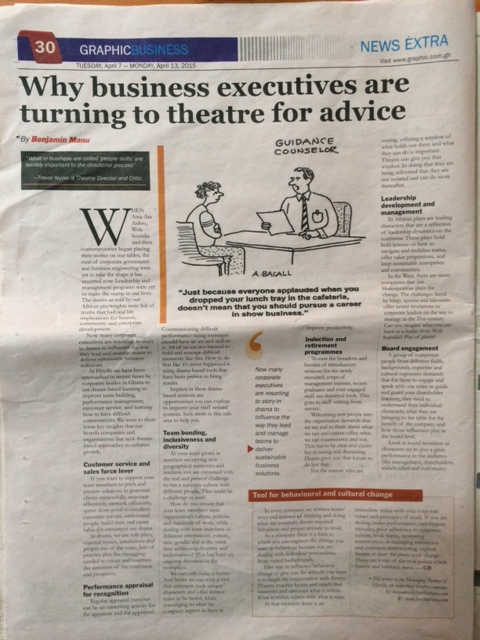This was published in Graphic Business on Tuesday, April 7, 2015.
‘What in business are called ‘’people skills’ are terribly important to the directorial process’’ Trevor Nunn, a Theatre Director and Critic
When Ama Ata Aidoo, Wole Soyinka, and their contemporaries began placing their stories on our tables, the root of corporate governance and business engineering were yet to take the shape it has assumed now. Leadership and management programs were yet to make the stamp in our lives. The stories as told by our African playwrights were full of truths that had real life implications for human, community and enterprise development. Now many corporate executives are resorting to story in drama to influence the way they lead and manage teams to deliever sustainable business solutions. At Hyville we have been approached in recent times by corporate bodies in Ghana to use drama-based learning to improve team building, performance management, customer service, and learinng how to have difficult conversations. We want to share some key insights that can benefit companies and organisations that seek theatre based approaches to enhance growth.
Customer service and sales force lever
If you want to support your team members to pitch and present solutions to potential clients, successfully, negotiate effectively, network efficiently, sprint from good to excellent customer service, understand people, build trust and create value for customers use drama. In drama we use role plays, enacted scenes, simulations and proper use of your voice, lots of practice plus the messaging needed to create and maintain the attention of your customers and prospects.
Performance appraisal for recognition
Regular appraisal exercises can be an unnerving activity for the appraiser and the appraised. Communicating difficult performance rating messages should have an art and skill to it. All of us are not blessed to hold and manage difficult moments like this. How to do that like it’s never happened is using drama-based tools that have been proven to bring results. Implicit in these drama-based sessions are opportunities you can explore to improve your staff reward systems. Seek more in this sub-area to help you.
Team bonding, inclusiveness and diversity
As your team grows in numbers occupying new geographical territories and markets you are thrust with the real and present challenge to run a seamless culture with different people. That could be a challenge in itself. How do you ensure that your team members meet organisation culture, policies and standards of work whiles dealing team members of different orientations, culture, race, gender and at the same time addressing diversity and inclusiveness? This has been an ongoing discourse at the workplace. We can only make it better. And better we can with a tool that embraces such unique characters and offer them a voice to be heard whiles converging to what the company aspires to have to improve productivity.
Induction and retiral programmes
To ease the bore and burden of introduction sessions for the newly recruited, corps of management trainees, recent graduates and your engaged staff use theatrical tools. This goes to staff retiring from service. Immersing new people coming in demands that we are real to them about what we can and cannot offer. What we can countenance and would not. That has to be clear. And clarity lies in seeing and discussing. Drama gives you that forum to do just that. For our seniors who are exiting, offering a window of what holds out there and what they can do is important. Theatre can gives you that window. In doing so you are telling them that they are not isolated and can do more after here.
Leadership development and management
In African plays are leading characters that are a reflection of leadership dynamics in Africa. These plays hold bold lessons on how to navigate and mobilize teams, offer value proportions, and keep sustainable enterprises and communities. In the West there are many companies using Shakespearean plays for change. The challenges faced by Kings, queens and labourers offer newer revelations to corporate leaders on the way to manage in the 21 century. Can you imagine what you can learn as a leader from Wole Soyinka’s Play of giants?
Board engagement
A group of competence people from different fields, backgrounds, expertise and cultural exposures demands that for them to engage and speak with one voice to guide and guard your shareholder interests, they need to understand their individual characters, what they are bringing to the table for the benefit of the company and how that influences play at the board level. Board members are characters set to give a great performance to the audience (the management, shareholders, stakeholders and customers).
Tool for behavioural and cultural change
In every company we witness teams’ ways and manner of thinking and doing what the company deems required behaviour and proper attitude to work. As a company there is a limit to which you can engineer the change you want in behaviour because you are dealing with individual personalities from varied backgrounds. One way to influence behaviour change to give you the attitude you want is to begin the conversation with theatre. Theatre touches hearts and minds that unnerves and uncovers what is within. What is within relates with what is seen. At that moment there is an immediate tinker with your corporate values and principles of work. Are you dealing under performance, unfortunate attitudes, poor adherence to corporate culture, weak teams, fostering collaborations, increasing assertiveness or managing transitions and corporate restructuring? Explore or experiment with theatre to start the process of change.
These are some of the true points were theatre and business meets. Go explore further.
Written by Benjamin Manu
Managing Partner of Hyville, an industrial theatre company
W: www.hyvilleghana.com

